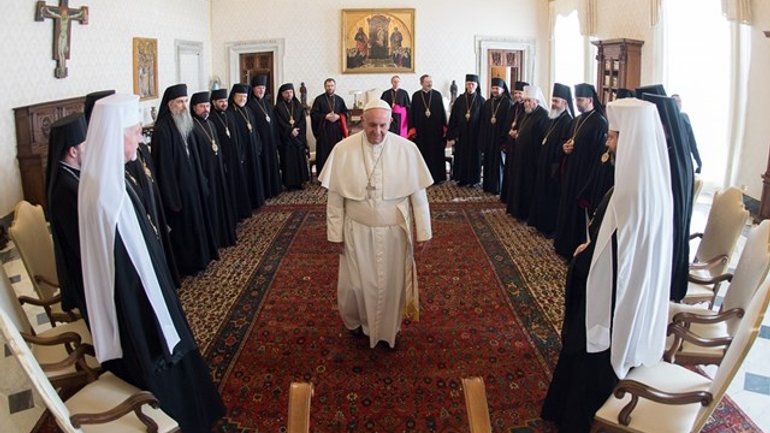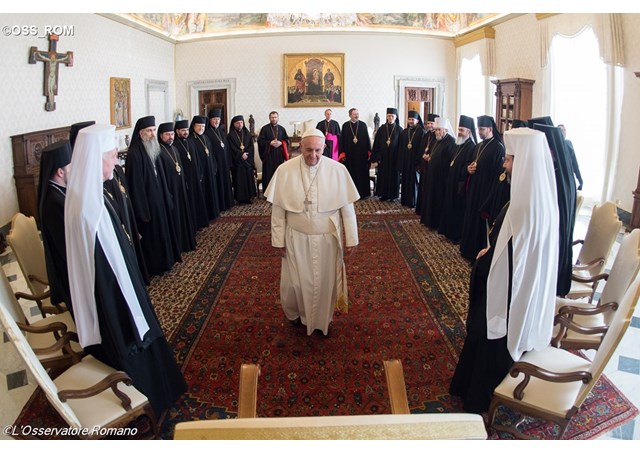Pope Expresses Total Support for Ukrainian Bishops

In an address widely misinterpreted by the media, Pope Francis expressed complete support for the Catholic bishops of Ukraine, telling them that “The Holy See has your back.” In remarks drafted in the special language of Vatican diplomacy, the pontiff addressed 4 issues: the ongoing war; the political situation; the effects of the crisis on ordinary people; mutual collaboration among the bishops.

Papal Solidarity
Pope Francis expressed his closeness to the Ukrainian bishops and to their people. Without mentioning it by name, he calls on Russia to adhere to the ceasefire agreement it signed in Minsk (which its agents have been flagrantly violating).
The pope notes there is a history behind the war, partially based on political questions. As to remote history, he means that Russia, which dominated half of Ukraine for 3 centuries, wants to regain control over the independent country. Recent history refers to the country’s Maydan revolution, which ousted a corrupt authoritarian regime and elected a pro-western democratically-minded government.
Francis confirmed that the bishops have a role to play in their country’s civic affairs, often an indirect role but sometimes also a direct one. They are not called to address politics directly but they are indeed called to address them indirectly. This means that, while they have done well in not supporting a particular political party, they must continue to speak out on those political issues which have moral implications. These include corruption and human rights violations. However, Francis added that the bishops are also called to intervene directly in “socio-cultural realities and human tragedies.”
The Pope identified “encounter, collaboration, the ability to resolve controversies” as values which characterize Ukrainian society. He suggests that these values had their origin in Ukraine’s position, which he alludes to in his opening greeting as being a “borderland,” or crossroads between different cultures and Christian traditions. Francis specifically alludes to role of peacemakers, which Ukrainian Catholics have taken up: “It is with charity, the divine love that springs from the heart of Christ, that you have made this ethical patrimony fruitful” (in other words, your Christian commitment helped you to fosterencounter, collaboration, and to resolve controversies).The Pope’s main thread is that the bishops have done well and should continue to be engaged in dialogue and peacemaking.
“The Holy See Has Your Back”
Pope Francis strongly affirms the bishops’ right to express their thoughts on the future of Ukraine’s internal affairs. The Church in any given country has a duty to indicate broad ethical and moral duties. Francis is supporting what the bishops are doing, commending them and encouraging them to persevere in it “in the tireless pursuit of harmony and of the common good, even in the face of grave and complex difficulties.”
The Pope immediately indicates his public support for their efforts: “The Holy See has your back, even in international forums, to ensure that your rights, your concerns, and the just evangelical values that animate you are understood.” The Russian Orthodox Church has repeatedly attacked the Ukrainian bishops’ ethical and civic engagement, depicting these as politically driven. Here Francis says the Holy See will continue to help the world understand that the bishops’ solidarity with their nation is legitimate.
Duty to Speak Freely
Pope Francis speaks of the effects of the confliction ordinary people. The bishops have repeatedly denounced corruption and the Pope takes up this theme under the heading of economic equality. Far from asking them to be silent, he encourages them to speak out: “Never tire of proposing to your fellow citizens the considerations that faith and pastoral responsibility suggest to you.” It is precisely because these issues are moral that the bishops have a duty to speak: “this task is entrusted to your responsibility as pastors.” Turning again to a theme the bishops have emphasized, it is precisely their position as “free ministers of the Church of Christ” (not beholden to political or economic interests, or the interests of another country, such as Russia) that their voices are effective.
He continues to “encourage” the bishops tore new their “pastoral zeal for the proclamation of the Gospel to Ukrainian society.” This means that, hitherto, their engagement was driven by their pastoral zeal. Rather than be discouraged, “The Vicar of Christ” offers them encouragement to continue their mission.
Working Together
The unity of the episcopate is important in social engagement because internal conflicts take away from effective witness and action. The Byzantine and Latin Churches have a long history of conflict in Ukraine. Francis encourages them to forgive and forget old wrongs and to concentrate on evangelization.
Pope Francis concludes by expressing confidence in their future decisions and invites the hierarchs to take counsel with him, as the supreme pastor of all peoples: “I am certain that your decisions, in accord with the Successor of Peter, will be adequate to meet the expectations of your People.”
“I’ve Got Your Back”
Given the delicate wartime situation, the Pope’s official remarks was carefully composed in a an ecclesial-diplomatic “key”, designed to express his views gently, without provoking a negative reaction from Russia and the Russian Orthodox Church. Francis’s message was addressed directly to the bishops and indirectly to international leaders. To both he sends a clear message: The Holy See completely supports the Ukrainian Catholic bishops in their collective efforts for the good of their Churches and their nation. This interpretation is consistent with the actual remarks the Pope made to the episcopate during the audience, where he stated that: “I am your servant. I am at your disposal and stand with you, shoulder to shoulder (I’ve got your back).”
Schevchuk: “What is going on in Ukraine is biggest catastrophe since World War II”









